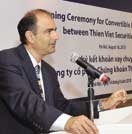Taking aim at major infrastructure shortfalls
 |
| Mr Rashad R. Kaldandy |
As Vietnam is in the early stages of rolling out public-private partnerships (PPP) to assist the country's economic development, the International Finance Corporation (IFC) has already realised PPP's great investment potential in Vietnam.
Rashad R. Kaldandy, the IFC's vice president for Asia, Eastern Europe, Middle East and North Africa, tells VIR about the corporation's investment targets in Vietnam.
How has the IFC committed to engaging in Vietnam’s socio-economic development?
IFC is committed to Vietnam, where we have more than a decade of hands-on experience in supporting the country’s economic growth. At a time when many financing sources have been scaled down, we have increased our commitments in Vietnam by combining long-term investments in support of small- and medium-sized enterprises (SMEs) with advice that fosters innovation and strengthens business standards.
IFC’s strategy in Vietnam is focused on reinforcing Vietnam’s economic competitiveness, promoting inclusive growth as the country urbanises and supporting environmentally sustainable investment.
We’ll deliver this by focusing on investments and advisory engagements in expanding and deepening Vietnam’s financial markets and access to finance, supporting the development of Vietnam’s infrastructure and supporting the development of energy efficiency and cleaner production financing tools as well as supporting Vietnam’s emerging entrepreneurs as they build business of scale and competitiveness.
In 2010 fiscal year, IFC invested $369 million in Vietnam and we expect the investment will be over $400 million for the next fiscal year. Our committed portfolio is $486 million and outstanding is $389 million.
In mid August 2010, IFC offered for the first time a loan package for a Vietnamese securities firm to fund Vietnamese small and medium enterprises (SMEs). Why did IFC decide to make this investment?
We have invested in a number of Vietnamese banks before, but this is IFC’s first engagement with a securities service provider in the country, Thien Viet Securities. It is a starting point for our work to strengthen more financial services providers in the country, with a focus on SMEs.
How is IFC supporting Vietnam in developing PPP in infrastructure?
IFC has been active in supporting the development of PPP in Vietnam through both its investment and advisory work. By public-private partnerships we mean projects where we help the public and private sectors to work together and complement each other.
IFC already helped to finance the Cai Mep port container terminal with a loan package of $215 million. We has also invested in a logistics company providing cold storage, Antara, in Ho Chi Minh City. In addition to providing financing, IFC has been the advisor to the Ministry of Industry and Trade since 2006 for the structuring and implementation of the 1,200 megawatt Nghi Son 2 coal-fired power plant. More recently, the Ministry of Transport requested IFC provide advice on the implementation of PPP for road building projects.
IFC has also contributed to the World Bank’s support for the Vietnamese government’s implementation of a new PPP framework since 2005. The framework includes technical assistance and financial support for well prepared partnerships to leverage private capital in infrastructure projects.
We believe we can bring a wealth of experience and expertise to bear in this sector and as Vietnam encourages more private sector investment in infrastructure, there is much we can and would like to do to encourage this process.
How does IFC combine investment and advisory services in infrastructure?
I expect we will do a lot more in infrastructure, both through investments and through the infrastructure advisory work we do with governments and regulatory bodies. Vietnam’s fast pace of growth in the last few years has created an urgent need for development of basic infrastructure.
While the major portion of this development will be handled by the government, private sector investment will be needed if the infrastructure gap is to be closed in a relatively short timeframe.
We plan to work on model infrastructure transactions to demonstrate to private international investors that there are attractive opportunities for investments in Vietnam’s infrastructure sector.
In parallel, we would provide financing to well-structured infrastructure projects which otherwise may not be available from commercial sources.
What the stars mean:
★ Poor ★ ★ Promising ★★★ Good ★★★★ Very good ★★★★★ Exceptional
Related Contents
Latest News
More News
- Hermes joins Long Thanh cargo terminal development (February 04, 2026 | 15:59)
- SCG enhances production and distribution in Vietnam (February 04, 2026 | 08:00)
- UNIVACCO strengthens Asia expansion with Vietnam facility (February 03, 2026 | 08:00)
- Cai Mep Ha Port project wins approval with $1.95bn investment (February 02, 2026 | 16:17)
- Repositioning Vietnam in Asia’s manufacturing race (February 02, 2026 | 16:00)
- Manufacturing growth remains solid in early 2026 (February 02, 2026 | 15:28)
- Navigating venture capital trends across the continent (February 02, 2026 | 14:00)
- Motivations to achieve high growth (February 02, 2026 | 11:00)
- Capacity and regulations among British areas of expertise in IFCs (February 02, 2026 | 09:09)
- Transition underway in German investment across Vietnam (February 02, 2026 | 08:00)

 Tag:
Tag:
















 Mobile Version
Mobile Version